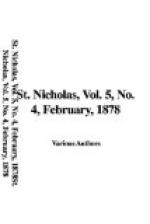Now you know what sort of a ship it is that I am going to tell you about. It was a camel, named Solimin. He was of a rare and valuable breed, known as “herie,” or coursers, because they are so much swifter than ordinary camels. Solimin’s master, Ahmed, was a poor man. He never could have afforded to buy a full-grown camel of this rare breed; and Solimin had become his through a piece of good fortune. When a little foal, Solimin was found in a lonely place in the desert, standing over the dead body of his mother, who had fallen and perished by the way. Led to the brown tent which was Ahmed’s home, the orphan baby grew up as a child of the family, lay among the little ones at night, and was their pet and plaything all the day. The boys taught him to kneel, to rise, to carry burdens, to turn this way and that at a signal. The girls hung a necklace of blessed shells around his neck, saved for him the best of the food, sang him songs (which he was supposed to enjoy), and daily kissed and stroked his gentle nose and eyes. As he grew big and strong, the pride of his owners grew with him. Not another family of the tribe possessed a herie. Once and again, Ahmed was offered a large price for him, but he rejected it with disdain.
“Would I sell my son—the son of my heart?” he said. “Neither will I part with Solimin. By the Prophet, I swear it.”
Of all the dwellers in the brown tent Solimin loved best Ahmed himself, and his eldest son, Mustapha. With them he was docile as a lamb; but if strangers drew near, or persons he did not like, he became restive and fierce, screamed, laid back his ears, and kicked with his strong hind legs. A kick from a camel is no joke, I can tell you. All the desert guides knew Solimin, and, for his sake, Ahmed was often hired to accompany caravans. Nay, once, at Cairo, Solimin was chosen to carry the sacred person of the Khedive on a day’s excursion up the Nile bank, which event served the tribe as a boast for months afterward.
It was the year after this journey to Cairo that Ahmed met with a terrible adventure. He and Mustapha, making their way home after a long journey, had lain down to sleep away the noontide hours, according to the custom of desert travelers. Their camels were tethered beside them, all seemed secure and peaceful, when, sudden as the lowering of a cloud, a party of Arabs, belonging to a wild tribe at enmity with all men, pounced upon them. Ahmed and his son defended themselves manfully, but what could two men, surprised in sleep, do against a dozen? In five minutes all was over. The assailants vanished in a cloud of dust, and Ahmed, who had been struck down in the rush, recovered his senses, to find camels, baggage, belt, money, everything gone, and Mustapha wounded and motionless on the earth beside him.
Ahmed thought him dead. They were alone in the desert, a hundred miles from home, without food or water, and with a groan of despair he sat down beside his son’s body, bowed his head, and waited until death should come to him also. An Arab believes in fate, and gives up once for all when misfortune occurs.




